
EDUCAÇÃO: OS IMPACTOS DA PANDEMIA DE COVID-19 NAS ESCOLAS
Este artigo pretende trazer algumas reflexões sobre o contexto singular que estamos vivendo como tempo de pandemia e seu desdobramento sobre a instituição escolar no Brasil. O desafio fundamental da educação brasileira passou a ser a adequação ao novo cenário imposto pela pandemia. Uma das medidas tomadas foi a inclusão da educação a distância – EAD - nas escolas como alternativa à interrupção das atividades presenciais. Esse dispositivo emerge para que os alunos possam cumprir a carga horária mínima exigida de horas aula. Desse modo, o presente artigo trata de dois temas que vêm preocupando os dirigentes de educação de todo o país, são eles, o fechamento das escolas devido à pandemia de COVID - 19 e a proposta de reorganização do calendário letivo dos alunos por meio do ensino a distância. Em situações que fogem á nossa vontade, é necessário que o processo ensino-aprendizagem se torne mais forte, que o déficit do conhecimento se torne o menor possível, conscientes dessa corresponsabilidade, do engajamento dos agentes educativos: professores e alunos. Para tanto, precisamos utilizar metodologias ativas, que façam interconexão do conteúdo com o contexto social dos alunos, numa relação humanística, solidária e empática. Diante dessa nova realidade, surgiu a reflexão na prática pedagógica, a capacitação dos professores e as metodologias utilizadas.
EDUCAÇÃO: OS IMPACTOS DA PANDEMIA DE COVID-19 NAS ESCOLAS
-
DOI: 10.22533/at.ed.0582001121
-
Palavras-chave: Covid-19, Educação Remota, Aprendizagem. Ensino remoto. Tecnologias de ensino
-
Keywords: Covid-19, Remote Education, Learning. Remote teaching. Teaching technologies
-
Abstract:
This article intends to bring some reflections on the singular context that we are living as a time of pandemic and its unfolding on the school institution in Brazil. The fundamental challenge of Brazilian education became to adapt to the new scenario imposed by the pandemic. One of the measures taken was the inclusion of distance education - EAD - schools as an alternative to interrupting face-to-face activities. This device emerges so that students can meet the required minimum class hours. Thus, this article deals with two themes that have been worrying education leaders across the country, they are them, the closure of schools due to the COVID - 19 pandemic and the proposal to reorganize the students' academic calendar through distance learning. In situations that are beyond our will, it is necessary that the teaching-learning process becomes stronger, that the knowledge deficit becomes as small as possible, aware of this co-responsibility, of the engagement of educational agents: teachers and students. For that, we need to use active methodologies, which interconnect the content with the students' social context, in a humanistic, supportive and empathic relationship. Faced with this new reality, reflection on pedagogical practice, the training of teachers and the methodologies used emerged.
-
Número de páginas: 11
- Silmário Batista dos Santos
- Fabricio Augusto Correa da Silva
- Valquiria Nicola Bandeira
- Antonio Marcos Vanzeli
- Débora Fernandez Antonon Silvestre
- SOLANGE APARECIDA DE SOUZA MONTEIRO


